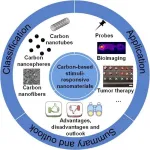(Press-News.org)
Testing older potential organ donors for dangerous ‘zombie’ cells could help to increase the number of hearts available for transplant, according to research part-funded by the British Heart Foundation (BHF) and presented at the British Cardiovascular Society conference in Manchester.
Currently, hearts from donors aged over 65 are not accepted for donation due to the likelihood of a poor clinical outcome. However, our hearts age at different rates and age isn’t necessarily the best indicator of heart health.
Researchers from Newcastle University are working to develop a test which may help clinicians determine quickly whether a donor heart may still be suitable for transplant. With around 320 people currently waiting for a lifesaving heart transplant, it is hoped this new test would help to increase the number of hearts available and allow more people to get the transplant they desperately need.
The research has shown that people with heart disease have more senescent – or ‘zombie’ – cells than those without, after they found higher levels of ‘zombie’ cell markers in their blood.
‘Zombie’ cells aren’t dead, but they don’t work as they should. They release molecules which can impact neighbouring cells, turning these into ‘zombie’ cells too. They also increase the amount of inflammation and cause scar tissue to form in the heart muscle. This raises the risk of developing heart and circulatory diseases.
The team now want to find out more about the ‘signature’ that ‘zombie’ cells leave in the blood and what that signature tells them about the biological as opposed to the chronical age of the heart. They think that a blood test to look for this signature in older potential donors could reveal those who have biologically young, healthy hearts that might be suitable for transplant.
Dr Gavin Richardson, Senior lecturer and lead of the Vascular Medicine and Biology Theme at Newcastle University, is leading the research. He said:
“Our work is revealing more about the clues that ‘zombie’ cells leave to suggest their presence in the body. We are confident that we will be able to use these clues to better understand which hearts from non-eligible donors might be able to be used after all.
“This could be a game changer – as currently most hearts from older donors are not used for transplant, but the hope is we will be able to show that a number of these organs are suitable for transplant for people desperately waiting for a new heart.”
When they looked at human heart cells in a dish, the researchers saw that the ‘zombie’ cells secrete higher levels of protein called GDF15 compared to healthy cells.
Using blood samples from 774 people aged over 85, the researchers then found higher levels of the GDF15 protein in the blood of people with heart disease than people without – suggesting that their hearts contain more ‘zombie’ cells.
The increase in GDF15 levels in the blood of people with heart disease was similar to that of another protein that is already used to diagnose heart failure – which made the researchers confident that they would be able to identify the cells associated with senescence.
The team also looked at the RNA in cells from eight donor hearts. RNA – short for ribonucleic acid – is similar to DNA and tells cells which proteins to make depending on the genes that are turned on. When researchers looked at another marker in these hearts linked to ‘zombie’ cells – called p21 – they found a strong link between this and another marker of heart and circulatory diseases.
The researchers believe these two molecules will form part of the ‘zombie’ cell signature that could be detected through a tissue or blood tests. They’re now using blood and tissue samples from the Quality in Organ Donation biobank and NHS Blood and Transplant to look for this signature and find out whether it’s linked to better transplant outcomes.
Professor James Leiper, Associate Medical Director at the British Heart Foundation, said:
“We are facing a heart failure epidemic with nearly one million people in the UK living with this condition – and for a small but significant number of these people the only cure we can offer is a heart transplant.
“We urgently need more hearts available for transplant, so it is very encouraging to hear about the work Dr Richardson and his colleagues are doing to help meet this demand.”
Derek Manas, Medical Director for Transplantation, at NHS Blood and Transplant said:
“With the need for organ donation and transplantation to happen quickly, it is helpful to explore the ways that new technologies and tests can help us assess the suitability of organs for transplant. For many reasons, hearts from donors of any age are often not suitable for transplant, so we are keen to support any research which may help us increase the number of hearts suitable for transplantation, save more lives and improve outcomes for those who are waiting.”
This research was also funded by the Medical Research Council.
END
Do whales increase the removal of carbon from the atmosphere?
Despite some hope that this would be the case, a new study led by Griffith University and a team of global researchers has found the amount of potential carbon capture by whales is too little to meaningfully alter the course of climate change.
Marine scientist Dr Olaf Meynecke and the team from the Griffith-led Whales and Climate Research Program including Professor Brendan Mackey and Dr Jasper De Bie, reviewed the primary ways in which baleen whales (such as humpback whales) removed atmospheric carbon ...
Key takeaways
A targeted therapy drug called vorasidenib had positive results in delaying progression of a specific form glioma, a slow-growing but deadly brain cancer.
In a study of 331 people with the disease, the drug was effective in lengthening the period of time before the patients’ cancer worsened, and with no observed adverse effects.
New treatment approaches for glioma are needed because current treatments, including chemotherapy and radiation, can cause neurological deficits.
In ...
An unprecedented investment by the University of Sydney, Australia will support up to 40 new continuing positions, empowering the world’s most talented emerging researchers to undertake innovative research to address some of the biggest challenges of our time.
A $100 million investment and a cornerstone of the University’s 2032 Strategy, the Sydney Horizon Fellowship scheme is the first of its kind in Australia and among the most generous university fellowships in the world.
“The Sydney ...
CHICAGO – Over the past decade, the approval of immune checkpoint inhibitors has revolutionized treatment for patients with advanced lung cancer, helping many live longer lives and improving overall survival for the disease. However, an important question has remained unanswered: How long should a patient with advanced non-small cell lung cancer (NSCLC), who receives immunotherapy as part of their initial treatment, continue with treatment?
A new retrospective cohort study, published today in JAMA Oncology and presented at the 2023 American Society of Clinical Oncology (ASCO) Annual Meeting (Abstract ...
About The Study: The findings of this study provide reassurance that for patients with advanced non–small cell lung cancer whose disease is still responding to immune checkpoint inhibitor therapy at two years, stopping therapy and monitoring rather than continuing immunotherapy indefinitely is a reasonable strategy with sustained clinical benefit.
Authors: Lova Sun, M.D., M.S.C.E., of the Perelman School of Medicine at the University of Pennsylvania in Philadelphia, is the corresponding author.
To access the embargoed study: Visit our For The Media website at this link https://media.jamanetwork.com/
(doi:10.1001/jamaoncol.2023.1891)
Editor’s ...
Presented today by VHIO’s Ana Oaknin at the 2023 ASCO Annual Meeting, 2-6 June (Chicago, IL), updated dose expansion data of the STRO-002-GM1 global phase I study* show promise of FolRα-targeting antibody drug conjugate (ADC) luveltamab tazevibulin in patients with recurrent FolRα-expressing epithelial ovarian cancer.
80% of patients included in this study presented with FolRα expression levels higher than 25%. The overall response rate among these patients was 43.8% in the dose expansion cohort, with a median duration of response ...
Carbon-based stimuli-responsive nanomaterials are gaining much attention due to their versatility, including disease diagnosis and treatment. They work under endogenous (pH, temperature, enzyme, and redox) or exogenous (temperature, light, magnetic field, ultrasound) stimuli. Carbon-based stimuli-responsive nanomaterials can be used as smart materials with dynamically tunable physicochemical properties in response to changes in internal or external environmental stimuli. Their diverse combinations of nanostructures and molecular designs, as well as functional ...
ABSTRACT: 4008
CHICAGO ― HER2-targeted bispecific antibody zanidatamab demonstrated durable responses in patients with treatment-refractory HER2-positive biliary tract cancer (BTC), researchers from The University of Texas MD Anderson Cancer Center reported at the 2023 American Society of Clinical Oncology (ASCO) Annual Meeting. The study results also were published today in The Lancet Oncology.
In the first cohort of the global Phase II HERIZON-BTC-01 trial, which included 80 patients with HER2-positive tumors, the confirmed objective response rate (cORR) was 41% with a median duration of response (DOR) of 12.9 months at a median follow-up of 12.4 months. ...
Survival rate beyond 10 years in children with drug-resistant epilepsy (DRE) was highest after cranial epilepsy surgery and lowest when treated only with antiseizure medications, according to a study published in The Lancet Child and Adolescent Health. This large, retrospective study was the first to compare long-term survival in children with DRE among cohorts treated with medications only, vagus nerve stimulation plus medications, and cranial epilepsy surgery plus medications. Results show that risk of early death was reduced by over 80 percent after surgery and by 40 percent after ...
When one thinks of movie reviews, one might see them as harbingers of success or failure at the box office. Some researchers have previously found that both positive and negative reviews correlate to box office revenues, and the effect of negative reviews diminishes over time.
However, researchers at the University of California, Davis, suggest that is not the case.
Researchers analyzed pre-release commentary and opening weekend box office revenue, turning the impact of movie reviews on its head and revealing an unexpected harbinger of failure phenomenon in the movie industry.
The study, ...



